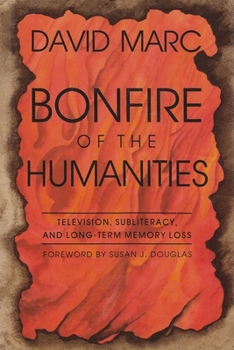Bonfire of the Humanities: Television, Subliteracy, and Long-Term Memory Loss
(Part of the Television and Popular Culture Series)
Select Format
Select Condition 
Book Overview
This volume focuses on the relationship between the rise of the multi-media environment-television and electronic media-and the decline of the humanities in academia, the changing role of print... This description may be from another edition of this product.
Format:Paperback
Language:English
ISBN:0815604637
ISBN13:9780815604631
Release Date:July 1998
Publisher:Syracuse University Press
Length:192 Pages
Weight:0.55 lbs.
Dimensions:0.5" x 6.0" x 9.0"
Customer Reviews
4 ratings
Emma Loves Beavis
Published by Thriftbooks.com User , 17 years ago
The main point of Bonfire of the Humanities is that there isn't a difference any more between what used to be called High and Low Culture. These categories might have been hard to define, but at least academics used to know where to put Titus Andronicus and where to put Star Trek. The Low Culture David Marc is most interested in is television, which he points out controls us by delivering pleasure, not pain, as dystopian literature sometimes predicted. But there were artists who foresaw how we would get hooked on TV. (Even the expression "hooked on" reduces the viewer to just another plug-in.) I remember a scene in Francois Truffaut's film Fahrenheit 451, where the fireman's wife is is watching/participating in a TV soap opera. The characters stop and address her by name, asking what they should do about the latest plot complication. What's worse is I don't remember if the scene is in Ray Bradbury's novel, which I read, or not. But I still remember the image from the movie. I've been educated out of the reading culture and into the viewing culture just like the character in Truffaut's film. What makes Marc's essays so informative (and a lot funnier to read in places than most university press books) is that he isn't a partisan of one culture over the other. He criticizes teachers who have allowed their students to graduate without developing a love for reading and writing as well as the professional curmudgeons who want to limit "education" to some cannon they've decided on. Did you know that reading Madame Bovary and watching Beavis and Butthead might drive you to the same kind of antisocial behavior? Huh huh huh. The film critic David Thomson said that there have been two terrible threats to humankind in the second half of the twentieth century - - nuclear weapons and television, and that the way it turned out television was the more insidious, beamed into our brains every day.
A Very Important Book
Published by Thriftbooks.com User , 17 years ago
This book is absolutely essential if you want to understand what television has done to Western Civilization. It is not a rant against shabby programming but a brilliant analysis of what the medium itself does to us, regardless of content. Marc is a compassionate and witty writer and his book deserves to be widely known and discussed.
Disquieting. We are what we watch . . . .
Published by Thriftbooks.com User , 24 years ago
To his credit, Marc, an erstwhile literary scholar, doesn't delve into the pseudo-academic question of whether television is or isn't a cornerstone of contemporary American culture. Instead, he examines what actually has transpired in the US -- the wholesale acceptance (and enjoyment) of the medium -- and describes its impact on the ever changing landscape of the Republic. With an oftentimes acerbic wit, Marc, lifts the curtain on the great Oz, allowing us to see who we are and what we've become, intellectually and culturally, whether we want to admit it or not. Ample notes let the reader discover further musings on the effects of this commonplace appliance. Overall, a brilliant -- if not disquieting -- social critique of Americans and our often reviled, often beloved boob tube.
Finally, a realistic book about TV's effect on education.
Published by Thriftbooks.com User , 25 years ago
I am a doctoral student in English and I teach multiple sections of Freshman Composition. This is the first book this presents a recognizable picture of the contemporary classroom: a place where literacy is taught as a specialist's skill to students immersed in television culture. If you are interested in the future of reading and writing, I recommend this book highly. It is also hilariously funny.




